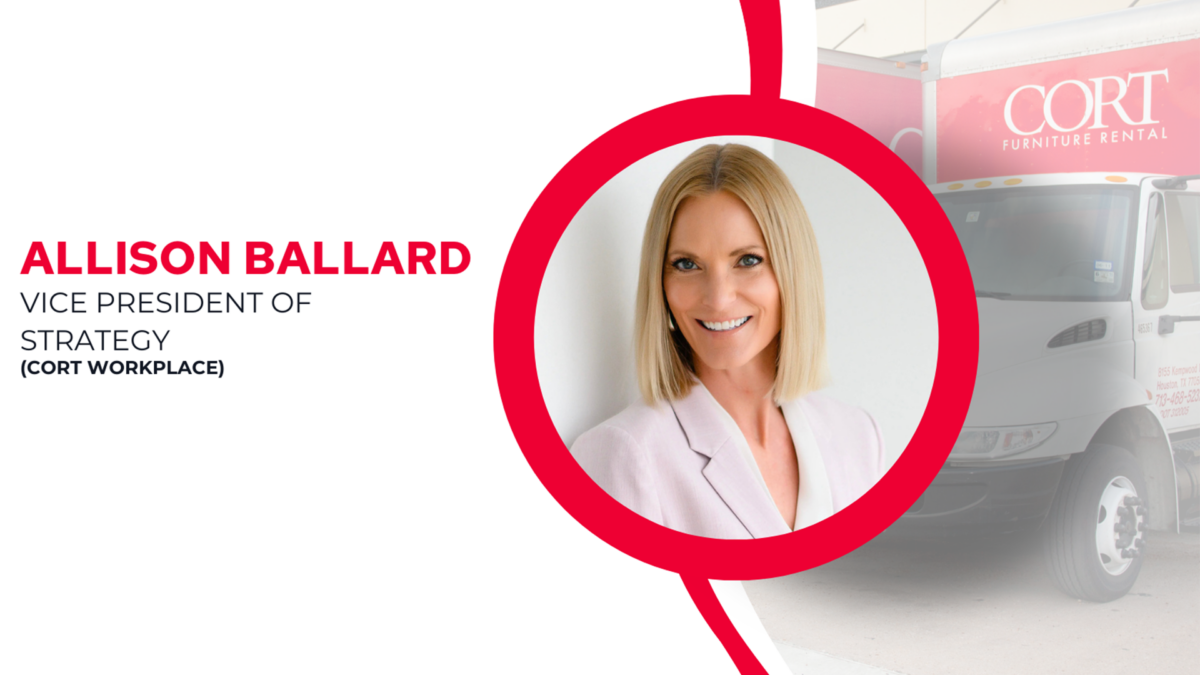A career in leadership is built over time—not through one defining moment, but through a series of challenges, decisions, and lessons learned along the way. Deborah “Debbie” Lansford, Chief Financial Officer of CORT Furniture Rental, has spent more than two decades helping shape a company while growing as a leader herself.
In this special episode of the CORT Workplace Talks, titled “The Exit Interview,” we sat down with Debbie to reflect on her remarkable career, the lessons she’s learned, and the wisdom she’s gained over her 40 years in accounting and finance. Listen in below for her valuable takeaways for anyone looking to grow as an individual and in their profession.
Debbie’s Early Challenges and the Path to Finding Confidence in Leadership
Confidence is often seen as a prerequisite for leadership, but in reality, many professionals develop it over time. Even the most experienced leaders have faced moments of self-doubt, questioning whether they belong at the table. A KPMG study found that 75% of female executives have experienced imposter syndrome, and 85% of professionals—men and women alike—believe confidence is essential for career growth.
Debbie knows this feeling well. When she entered finance in the 1980s, she often found herself as the only woman in the room. “You got noticed because you were the only one,” she recalls. But visibility didn’t always translate to belonging.
She remembers a time when business dinners often included a company secretary—not because their role required it, but simply to ensure she wasn’t the only woman at the table. “I’ve been on international business trips where I was the only woman in the room. And to make me feel more comfortable, whoever we were meeting would invite their secretary to dinner—just so I wouldn’t be the only woman there.”
This practice reflected the workplace norms of that era, where women in leadership were often isolated in professional settings. At the time, women held just 5% of executive roles in Fortune 500 companies, compared to 26% today.
Rather than allowing self-doubt to hold her back, Debbie focused on developing her skills and seeking out mentors who could provide guidance. “Probably no one is harder on me than me,” she admits. “It took a long time to gain that sense of confidence—that hey, I know this just as well as anybody else does, and I can do this just as well as anybody else does.”
She emphasizes the value of mentorship and peer support in building confidence. “Sometimes, you just need someone to remind you that you belong. Reaching out to others, learning from their experiences, and hearing that they’ve had the same doubts—it helps.”
Advice to Her Younger Self
When asked what advice she’d give her younger self, Debbie’s answer is simple: Relax. “I’ve always worked hard, but I probably should have learned to relax sooner. Don’t take yourself so seriously. Setbacks will happen, but they don’t define you.”
She also emphasizes the importance of perspective. “One decision won’t make or break your career. The arc of your career is long, and it won’t be smooth—but that’s okay. Every challenge is an opportunity to learn.”
Why Adaptability and Learning Matter More Than Ever
No one reaches the top of their career by staying the same. The most successful leaders are those who continuously learn and adapt, recognizing that what worked yesterday may not work tomorrow.
This is more relevant than ever, with industries evolving at an unprecedented pace. A World Economic Forum study found that 94% of business leaders believe continuous learning is essential for career success, and those who prioritize adaptability are 30% more effective at managing change.
Debbie sees this as one of the most important skills a leader can cultivate. “When you get to a place where you feel like you know everything, that’s very dangerous,” she says. “I’m much more comfortable around people who aren’t so sure—who take a step back, reassess, and come up with the right answer.”
With AI and automation reshaping industries, executives are redefining their roles. 70% of CFOs now use AI tools to enhance decision-making, shifting focus to creativity, emotional intelligence, and strategic thinking.
Debbie believes that learning how to ask the right questions is just as important as finding the answers. “You still have to work hard to build a good base of knowledge so you can ask good questions. When you lose the ability to ask good questions, that’s when you get lost.”
The Power of Mentorship at Every Career Stage
Few people achieve success alone. At every stage of a career, mentorship can make a lasting difference, helping professionals gain perspective, expand opportunities, and navigate challenges.
Research supports this: Employees with mentors are five times more likely to be promoted than those without one.
For Debbie, mentorship wasn’t just about receiving guidance—it was about paying it forward. “I’ve had incredible mentors—both men and women—who helped me grow. And now, as I look back, I see how much it means to others when I take the time to offer guidance.”
Mentorship strengthens organizations as well. Companies with formal mentorship programs report 50% higher retention rates, as mentorship builds stronger workplace cultures and leadership pipelines.
Debbie also values reverse mentorship, where senior leaders learn from younger professionals. “There’s always something to learn, no matter how far along you are in your career. The best leaders know that growth never stops.”
Work-Life Balance and Personal Well-Being in Leadership
A successful career can be incredibly fulfilling—but it can also be all-consuming if balance isn’t maintained. Navigating a demanding career while managing personal responsibilities is a challenge many professionals face—especially women in leadership, who are often expected to excel in both spaces simultaneously. While work-life balance has become a central conversation in the workplace, statistics show that women continue to face disproportionate challenges in achieving it:
- Burnout rates are significantly higher for women in leadership, with 43% reporting burnout compared to 31% of men (Linearity).
- Nearly half (46%) of women worldwide report feeling burned out, compared to 37% of men (Linearity).
- Women fear that requesting flexible work will hurt their careers, with 97% believing it could impact promotion opportunities (Linearity).
- The “motherhood penalty” affects leadership opportunities, as 24% of women exit the workforce within the first year of motherhood (PMC).
Debbie understands this firsthand. Balancing a high-powered career with raising five children was no small feat, and she admits there were moments of exhaustion and doubt. “I look back and think, ‘How did I do all that?’” she laughs.
More than ever, professionals are rethinking how they structure work and personal life. 80% of employees say workplace flexibility reduces stress, but real balance requires more than just remote work—it demands clear boundaries and prioritization.
Debbie believes this is where leaders need to set an example. “We only have one opportunity to raise our kids, to be present for the moments that matter. Making time for those moments is what balance really means.”
Creating a Lasting Impact
Debbie’s leadership has left a lasting impact on CORT, shaping a culture of mentorship, adaptability, and trust. While she never set out to do this, Debbie acknowledges that simply doing her job well and supporting others has led to meaningful change. “People tell me all the time, ‘You did this, and it meant a lot to me,’ but at the time, I was just doing what I thought was right.”
At CORT, she has seen the power of a supportive corporate culture, where leadership genuinely invests in employees. “When you lead with integrity and trust, you build a workplace where people feel valued and supported.”
Her journey is proof that leadership isn’t about having all the answers—it’s about being willing to learn, mentor, and adapt. Whether you’re an executive, a mid-career professional, or just starting out, her insights offer valuable lessons in resilience, learning, and balance.
For those looking to grow in their careers or explore CORT’s innovative business solutions, visit CORT.com to learn more.




